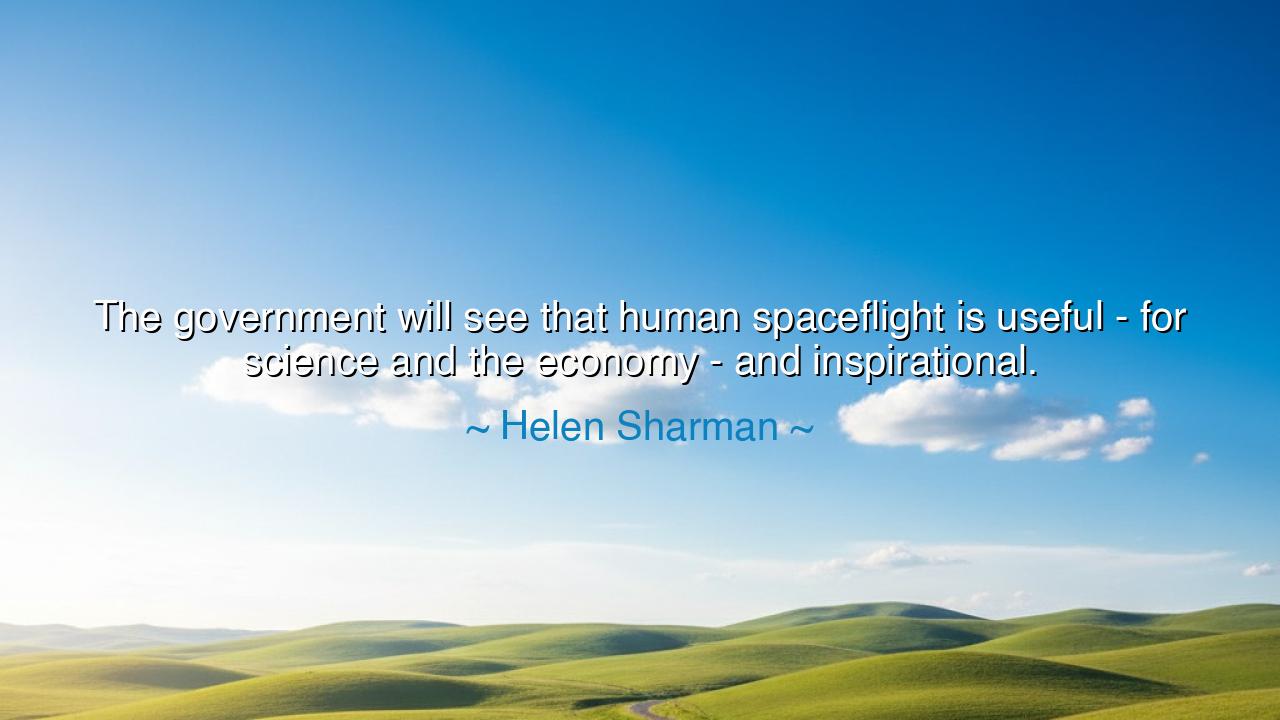
The government will see that human spaceflight is useful - for
The government will see that human spaceflight is useful - for science and the economy - and inspirational.






In the grand expanse of human endeavor, there are moments when we look beyond the confines of our world, yearning to touch the heavens, to explore the vast unknown that calls to our spirits. Helen Sharman, in her reflection on the future of human spaceflight, speaks to a powerful truth when she says, "The government will see that human spaceflight is useful - for science and the economy - and inspirational." These words touch upon the profound potential of space exploration—not just as a scientific pursuit, but as a source of economic advancement and spiritual inspiration. Human spaceflight is not just about the advancement of technology, but about the expansion of the human spirit, the daring to venture into the vastness of space in the pursuit of knowledge and progress.
In the ancient world, the human spirit was often imagined as something that could transcend the boundaries of the earthly realm, reaching for the gods and the stars. In the tales of the Greek heroes, such as Icarus, there was both awe and danger in the human attempt to reach beyond their mortal limits. Though Icarus’ flight ended in tragedy, the very idea of soaring into the sky, of pushing the limits of human capability, was considered both inspirational and cautionary. It spoke to the desire to rise above, to strive for something greater than oneself, to reach for the divine. Just as Icarus sought to touch the sky, so too do modern astronauts and scientists dare to go beyond what is known, to reach for the stars. Their journey becomes not just a pursuit of knowledge, but a symbol of human perseverance and the inspiration that such efforts provide to future generations.
The notion of human spaceflight as a means of economic benefit and scientific progress is not new. Consider the explorations of the great navigators of the 15th century, like Christopher Columbus or Vasco da Gama, who sailed into unknown seas, driven by a thirst for knowledge and the promise of wealth. Their journeys were fraught with danger, but also with the promise of discovery. The economic benefits of their voyages, from the discovery of new lands to the expansion of trade, were immense. In the same way, space exploration promises not only to expand our understanding of the universe but to unlock new frontiers of economic opportunity—through the advancement of technology, the discovery of new resources, and the possibility of interplanetary trade. **Sharman’s words remind us that, just as exploration has always opened new economic frontiers, so too will space exploration lead to prosperity and the expansion of the human enterprise.
But it is not just the economic and scientific benefits that make human spaceflight so vital; it is the inspiration it offers to the human soul. When we look to the stars, we do not simply see distant planets and galaxies; we see the reflection of our own potential, our own capacity to achieve the impossible. The moon landing in 1969, when Neil Armstrong took those first steps on the lunar surface, was not just a scientific achievement—it was a moment of collective wonder, a testament to human ingenuity and perseverance. In that moment, the world watched as a single human footstep left its mark on the surface of another world. Such moments remind us of the power of human dreams and the limitless possibilities that come when we dare to dream beyond the bounds of the known world.
The lesson we learn from Sharman’s reflection, from the ancient stories of exploration, and from the achievements of our own time, is clear: we are capable of much more than we imagine, but only if we have the courage to pursue what seems impossible. The pursuit of knowledge, whether through space exploration, scientific discovery, or artistic creation, requires vision, dedication, and boldness. Just as the great explorers of old ventured into unknown waters, so too must we be willing to venture into new territories—both of the mind and the spirit. Inspiration is not born of comfort; it is born of effort, of sacrifice, and of the willingness to explore the unknown.
The call to action, then, is not just to watch from the sidelines as others push the boundaries of knowledge, but to participate in the exploration, to be part of this great journey of discovery. Whether through the scientific fields, the arts, or any pursuit of knowledge, we must not shy away from the great work that lies ahead. Like Helen Sharman, who dared to dream of space and took part in that grand vision, we too must find our own place in the world of exploration. Ask yourself, what frontiers are you willing to push? What unknowns will you dare to uncover? The human spirit has always risen to the challenge, and we, like the heroes of old, must continue the quest.
To future generations, take this wisdom with you: never stop exploring, never stop dreaming. Whether we look to the stars or to the depths of the earth, there is always something new to discover. The world is waiting for your vision, your courage, and your willingness to explore and create. Just as human spaceflight will inspire future generations to reach beyond the horizon, so too can you inspire others through your own dedication to progress, discovery, and human potential.






AAdministratorAdministrator
Welcome, honored guests. Please leave a comment, we will respond soon